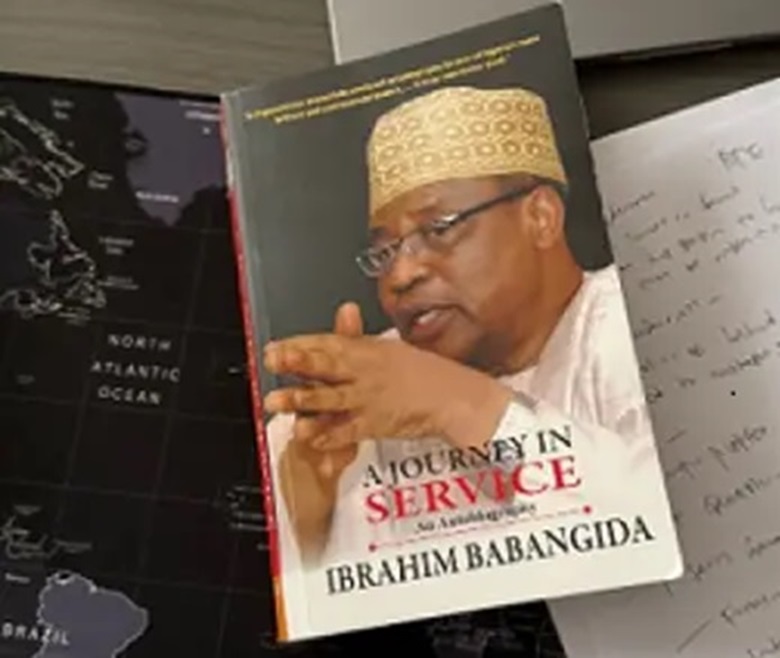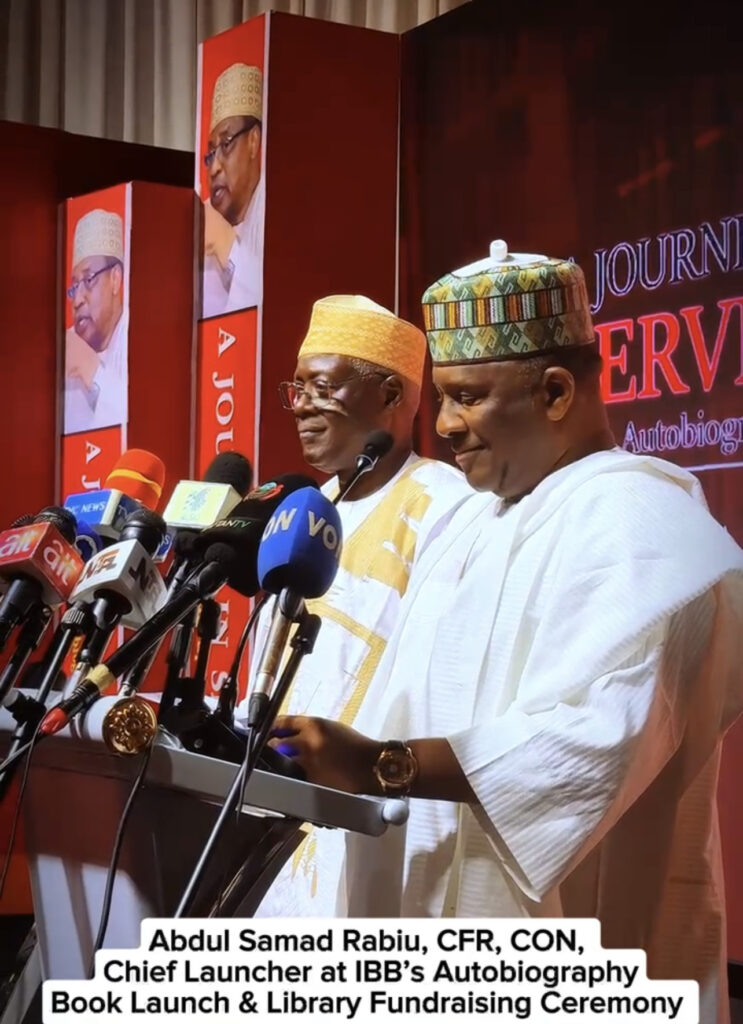– How He Became Pillar of the IBB Presidential Library
– When Philanthropy Meets Patriotism: A Billionaire’s Love Letter to Nigeria’s Future
 Abdulsamad Rabiu is not your typical philanthropist. Few hours ago, inside the grand halls of the Transcorp Hilton, Nigeria stood witness to his fabled generosity. The occasion was the public unveiling of General Ibrahim Badamasi Babangida’s memoir, A Journey in Service, a chronicle of governance and power. Yet, as the pages of history were turned, another story was written—not in ink, but in deeds. It was the story of Abdulsamad Rabiu, a titan whose touch transforms industry into impact, and whose generosity knows neither pause nor parallel.
Abdulsamad Rabiu is not your typical philanthropist. Few hours ago, inside the grand halls of the Transcorp Hilton, Nigeria stood witness to his fabled generosity. The occasion was the public unveiling of General Ibrahim Badamasi Babangida’s memoir, A Journey in Service, a chronicle of governance and power. Yet, as the pages of history were turned, another story was written—not in ink, but in deeds. It was the story of Abdulsamad Rabiu, a titan whose touch transforms industry into impact, and whose generosity knows neither pause nor parallel.
As pledges were made and commitments sealed, one figure emerged as the lodestar of philanthropy. With a single gesture, Rabiu, the industrialist whose empire stretches across cement, sugar, and commerce, etched his name into Nigeria’s living history with a donation of ₦5 billion, the largest single commitment to the IBB Presidential Library project. In doing so, he did not merely write a cheque; he inscribed a promise—one of preservation, of education, of a future anchored in the lessons of the past.
 If you ask Rabiu, he would tell you that libraries are more than buildings; they are sanctuaries of knowledge, vaults where the echoes of governance, sacrifice, and triumph find a home. The IBB Presidential Library, envisioned as a repository of Nigeria’s political and military history, stands to immortalize the narratives that shaped the nation. For Rabiu, this was a cause worthy of patronage.
If you ask Rabiu, he would tell you that libraries are more than buildings; they are sanctuaries of knowledge, vaults where the echoes of governance, sacrifice, and triumph find a home. The IBB Presidential Library, envisioned as a repository of Nigeria’s political and military history, stands to immortalize the narratives that shaped the nation. For Rabiu, this was a cause worthy of patronage.
His donation was more than financial—it was philosophical. “Leadership is not only about the present; it is about the legacy we build and the history we preserve,” Rabiu remarked as he made his contribution. “Supporting this library is an investment in Nigeria’s history and future generations.”
In a room filled with past and present leaders, Rabiu’s name resonated with the gravitas of a statesman. Nigeria’s former presidents—Olusegun Obasanjo, Yakubu Gowon, Goodluck Jonathan, and Abdulsalami Abubakar—stood as sentinels of the nation’s history. The presence of Ghana’s former President, Nana Akufo-Addo, and President Bola Ahmed Tinubu himself underscored the significance of the moment. Yet, among these political luminaries, it was Rabiu, a man of enterprise rather than electoral office, who stood tallest in philanthropy.
General Babangida, moved by the outpouring of generosity, singled out Rabiu for special commendation. “He has been with us since the beginning,” IBB declared, his voice laced with both gratitude and admiration. “Abdulsamad is not just a donor; he is a builder of history.”
His commitment was not newfound, nor was it performative. Long before the evening’s pledges, Rabiu had been a steadfast supporter of the library project, understanding that leadership is not just about governing the present, but about securing the past for the education of the future.
Philanthropy as Poetry, Industry as Art
Rabiu’s giving is not impulsive but intentional—every act, a stanza in a grand poem of national upliftment. Through the Abdul Samad Rabiu Africa Initiative (ASR Africa), he has committed over $300 million to transformative causes across education, healthcare, and social development. His wealth does not merely circulate in markets; it irrigates the parched landscapes of need, turning deserts of despair into gardens of hope.
It was this same philosophy that guided his decision to lower the price of cement to ₦3,500 per bag—a move not of profit, but of purpose. In a nation where homeownership is often an elusive dream, Rabiu sought to turn castles in the air into concrete realities. Though market forces resisted his benevolence, his attempt stood as a testament to his unwavering commitment to the Nigerian people.
More Than a Businessman, A Builder of Dreams
To call Abdulsamad Rabiu merely a businessman is to diminish the expanse of his influence. He is an architect of opportunity, a maestro of impact whose wealth moves beyond personal luxury into national necessity. He has been a lifeline for widows through the International Women’s Society, an enabler of innovation through his support of SheWinsAfrica, and a bridge to the future for young girls in Northern Nigeria, ensuring that STEM education reaches hands once denied the tools of progress.
His impact is not transactional; it is transformational. He does not give out of surplus, but out of purpose. Where some amass wealth as an ornament of self-adulation, Rabiu sees his fortune as a vessel for collective progress.
A Legacy Carved in Gold and Granite
The night at the Transcorp Hilton will be remembered for its convergence of power and philanthropy, of history and the future. Yet, long after the speeches fade into memory, long after the ink of Babangida’s memoir dries, one truth will endure: Abdulsamad Rabiu has inscribed his legacy not in fleeting applause, but in the indelible granite of history.
While the footprints of others may be washed away by the tides of self-interest, Rabiu’s prints remain—solid, unshakeable, eternal. His legacy is not just in the billions he donates, but in the futures he secures, the histories he preserves, and the nation he helps build.
In a world where wealth is often hoarded, Abdulsamad Rabiu chooses to share. In an age where power often corrupts, he wields his influence for good. And in a time when history risks being forgotten, he ensures it is both written and preserved.
A titan, a statesman of enterprise, and a custodian of Nigeria’s past and future—Abdulsamad Rabiu stands, not just as the highest donor of the evening, but as the golden standard of philanthropy in Nigeria.



